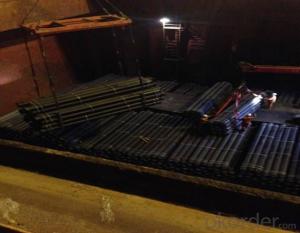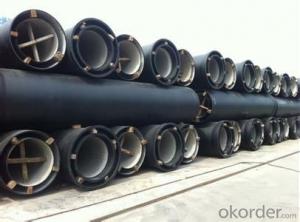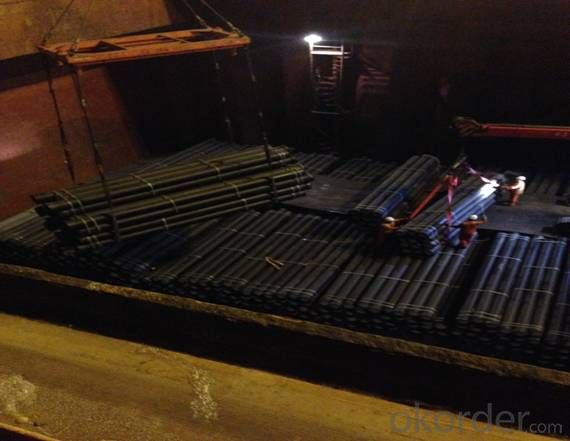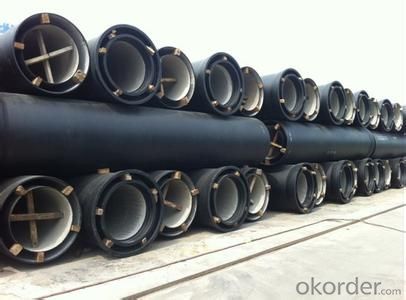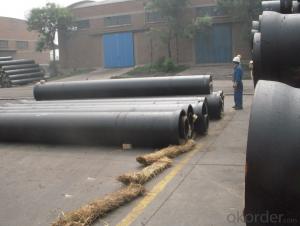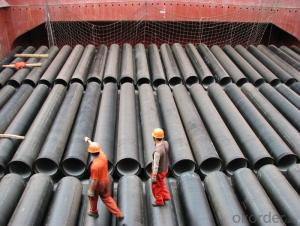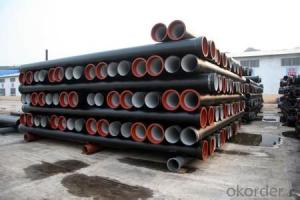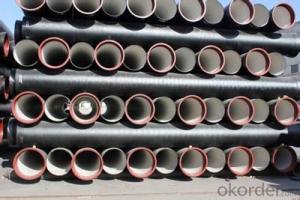DUCTILE IRON PIPE K8 DN450
- Loading Port:
- China Main Port
- Payment Terms:
- TT OR LC
- Min Order Qty:
- -
- Supply Capability:
- -
OKorder Service Pledge
OKorder Financial Service
You Might Also Like
Ductile Iron Cast Pipe is without any defects compare with tradition casting tech, which has many advantages particularly as follow:
(1) High density. In the "vertical upward casting" process, the melt iron of centre liquid column in center crystallizer is continuously feeding for volume shrinkage caused by condensation tube at outer circumference , which lead to be free of shrinkage porosity.
(2) High purity. When melt iron pouring, the mixed impurities such as gas, dross, sand grain which are lighter than melt iron could be eliminated at furnace mouth, its impossible to enter into the crystallizer through the channel, so the melt iron into the crystallizer is very pure.
(3) Strength with toughness. The cooling speed provided by continuous crystallizer is 30 times than sand casting and 5 times than centrifugal casting, and doesn't produce white iron, the eutectic cell volume of continuous cast iron is one eighth to one tenth compare with traditional cast iron. The density of graphite nodule in ductile iron can reach 300-700 pcs/mm2. Therefore, all reason above improve the strength and toughness of continuous cast iron.
(4) Free machining. The high speed cooling make the hardening phase (such as boride, steadite) not appear like reticular, massive or thick, but diffuse like fish bone and pane in shape, moreover, there are tiny graphite flakes inlaid hardening phase. It's free machining in BrinellHardness the range of 250-300HB. However, the Brinell Hardness of 250 is top limit to common metal materials.
(5) Uniform composition of tube wall. The convection mixing of liquid column caused by marching type drawing in crystallizer make the composition of tube wall well-distributed, and concentration gradient very little.
(6) High productivity. To the wall thickness of tube under 10mm, the speed of continuous casting is 1 meter/min, to the wall thickness of tube under 20mm, the speed of continuous casting is 0.5 meter/min, which is high efficiency that centrifugal or other casting tech couldn't reach.
- Q: What are the different methods for joining ductile iron pipe?
- There are several methods for joining ductile iron pipe, including mechanical joints, flanged joints, push-on joints, and restrained joints. Mechanical joints use a rubber gasket and a series of bolts and glands to create a secure connection. Flanged joints involve bolting two flanges together with a gasket in between. Push-on joints utilize a rubber gasket and require the pipe to be pushed into the joint. Restrained joints use a combination of mechanical joints and a restraining gland to prevent movement and provide a secure connection.
- Q: Can ductile iron pipes be used in nuclear power plants?
- Yes, ductile iron pipes can be used in nuclear power plants. Ductile iron is a type of cast iron that has improved flexibility and strength compared to traditional cast iron pipes. These pipes are known for their durability, corrosion resistance, and ability to withstand high pressure and temperature conditions. In nuclear power plants, where there is a need for a reliable and robust piping system to transport water, coolant, and other fluids, ductile iron pipes can be a suitable choice. However, it is important to note that the specific requirements and regulations of each nuclear power plant should be considered before selecting the pipe material. Proper testing, certification, and compliance with nuclear industry standards should be ensured to guarantee the safe and efficient operation of the power plant.
- Q: Does the cast iron pipe for spheroidal graphite need corrosion protection when laying underground?
- In quality, the spheroidization of cast iron pipes is controlled to be 1-3 (spheroidization rate 80%), so the mechanical properties of the cast iron pipes, ductile iron pipes and finished product libraries can be better improved, with the nature of iron and the properties of steel
- Q: Is it better to use steel tubes or ductile iron pipes for water supply?
- Flexible seamless steel pipe is good toughness, good processing, better than ductile iron corrosion resistance, the price is slightly higher;
- Q: Can ductile iron pipes be used for water tunnel crossings?
- Indeed, water tunnel crossings can utilize ductile iron pipes. Renowned for their robustness, longevity, and immunity to corrosion, ductile iron pipes prove to be an ideal option for diverse purposes, including water tunnel crossings. Their ability to endure immense pressure, external burdens, and soil movements, commonly experienced in tunnel crossings, is commendable. Moreover, ductile iron pipes boast an extended lifespan and necessitate minimal upkeep, rendering them an economical resolution for water tunnel crossings.
- Q: Can ductile iron pipe be used for irrigation systems?
- Yes, ductile iron pipe can be used for irrigation systems. It is a strong and durable material that can withstand the pressures and demands of irrigation applications, making it a suitable choice for transporting water in agricultural settings.
- Q: How do ductile iron pipes perform in high-altitude areas?
- Ductile iron pipes perform well in high-altitude areas as they are highly resistant to corrosion and can withstand extreme temperature variations. The material's flexibility and strength make it suitable for handling increased pressure caused by altitude changes, ensuring reliable water distribution systems even in mountainous regions.
- Q: Can ductile iron pipe be used for cooling water systems?
- Certainly, cooling water systems can utilize ductile iron pipe. With its exceptional corrosion resistance, remarkable tensile strength, and ability to withstand high-pressure scenarios, ductile iron pipe proves itself suitable for a range of applications, including cooling water systems. Its durability and versatility ensure the efficient transportation and distribution of cooling water, eliminating the likelihood of leakage or malfunction. Moreover, ductile iron pipe is renowned for its extended lifespan and minimal upkeep demands, rendering it an economically sound option for cooling water systems.
- Q: Can ductile iron pipe be used for marine applications?
- Yes, ductile iron pipe can be used for marine applications. Ductile iron is a type of cast iron that possesses high strength, durability, and resistance to corrosion. These properties make it suitable for various marine environments, including saltwater applications. Ductile iron pipes are commonly used for marine applications such as seawater intake and outfall systems, offshore oil and gas platforms, submarine pipelines, and marine dredging projects. The corrosion-resistant nature of ductile iron helps protect against the harsh conditions found in marine environments, such as corrosive saltwater, tidal currents, and marine organisms. Additionally, ductile iron pipes are known for their excellent mechanical properties, including high tensile strength and impact resistance, which further enhance their suitability for marine applications. Overall, ductile iron pipe is a reliable and cost-effective choice for various marine applications.
- Q: Can ductile iron pipes be used for gravity sewer systems?
- Yes, ductile iron pipes can be used for gravity sewer systems. Ductile iron pipes have the necessary strength, durability, and corrosion resistance to handle the flow of wastewater and withstand the external loads of a gravity sewer system. They are commonly used in underground applications where the pipes are laid in a trench and rely on gravity to transport the sewage.
Send your message to us
DUCTILE IRON PIPE K8 DN450
- Loading Port:
- China Main Port
- Payment Terms:
- TT OR LC
- Min Order Qty:
- -
- Supply Capability:
- -
OKorder Service Pledge
OKorder Financial Service
Similar products
Hot products
Hot Searches
Related keywords
